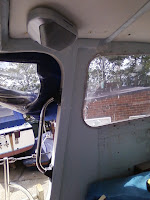Whese areas are where most of the stresses would be... as there are no stays, all the strains are on the partner and step, so there could be no weaknesses...
One of my recurring nightmares is when I am trotting up the harbour at great knotts and a squall hits, a huge crack and the top of the cabin disappears with the mast! Cabriolet cabin.... ohhh nooooooo.... So, given the absence of any technical data when the boat was built etc, it was a case of common sense and a great big dollop of over-engineering!
When you look at sailing, everything is see-saws n' fulcrums... this is no different, the partner/coach-roof takes mainly the sideways/lateral strains.. but just a few wooden wedges between the mast and the partner? hmmmm..... and the keel step takes most of the vertical stresses.... just a bolt through the mast/step? No wonder you get nightmares moosh!
The distance between the top of the keel to the coach roof... the Bury....is critical, according to the good book, the minimum needed would be about 2ft, as we have over 6ft, this is really good news. The larger the distance the more it reduces the sideways leverage effect of the mast on the roof.
Whilst that was the good news, the bad news was that all the bulkheads are pierced by large windows, as these have no value stress-wise, the result is that all these lateral strains would be concentrated onto three very small, thin, GRP corners and the gaps between the windows...
To overcome this I beefed up the corners with plywood knees, fitted a new bulkhead across the cabin (just behind where the mast partner would go) and whacked some wooden cross pieces between all. These were all glassed in (3 layers GRP, normal wovings).
So some pictures!!
 |
| Before! |
 |
| Knees fitted |
 |
| Knees in centre and new bulkhead |
 |
| New bulkhead (dont look at the drips?!) |





